Alienware m15 R4 (2021) review
Alienware m15 R4: Specs
CPU: Intel Core i7-10870H CPU @ 2.20GHz, 2.21 GHz
GPU: Nvidia GeForce RTX 3070
Display: 15 inches, 4K OLED
RAM: 16 GB
Storage: 1 TB SSD
Dimensions: 15.3 x 12.0 x 1.0 inches
Weight: 5.3 pounds
The Alienware m15 R4 is what gaming laptops should aspire to be. That’s not to say that this $2,500 machine is perfect. But it does deliver everything you need for a delightful, portable gaming experience, and very little that you don’t. From its powerful components, to its tasteful white chassis, to its comfortable keyboard, the m15 R4 will let you play all of your favorite games – in full 4K, if desired – no matter where you want to set up.
Admittedly, there are a few things that I wish the m15 R4 had done differently. By default, the fan is extraordinarily loud, but quieter fan settings also result in a hotter machine. Some features, like eye-tracking, add a lot of money to the asking price, in exchange for pretty niche functionality. The port placement is also not as forward-looking as it could be, particularly when it comes to USB-C functionality.
Still, taken as a whole, I enjoyed just about everything I did with the m15 R4. If you’re looking to spend more than $2,000 (and, to be fair, not everyone is), it’s easily one of the best Windows laptops for gaming and one of the best gaming laptops you can get, particularly since the state-of-the-art hardware should last you a long time. Read on for our full Alienware m15 R4 review.
Alienware m15 R4 review: Price and availability
The Alienware m15 R4 is available right now from Dell, and takes about two weeks to ship.
In terms of pricing, the absolute cheapest model we could customize costs $2,150. This configuration includes an Intel Core i7-10870H CPU, an Nvidia GeForce RTX 3070 GPU, 16 GB RAM, a 256 GB SSD, a 1080p display with a 300 Hz refresh rate and a four-zone RGB keyboard.
At the other end of the spectrum, you could customize a $4,140 behemoth. This version of the m15 R4 includes an Intel Core i9-10980HK CPU, an Nvidia GeForce RTX 3080 GPU, 32 GB RAM, 4 TB + 512 GB SSDs, a 4K OLED display with a 60 Hz refresh rate and Tobii eye-tracking, and a per-key RGB keyboard. It’s hard to think of a more powerful gaming laptop on the market at the moment.
The version we tested retails for $2,500, and its specs are somewhere in the middle. Our model includes an Intel Core i7-10870H CPU, an Nvidia GeForce RTX 3070 GPU, 16 GB RAM, a 1 TB SSD, a 4K OLED display with a 60 Hz refresh rate and Tobii eye-tracking and a four-zone RGB keyboard. This seems like a reasonable middle ground, although honestly, the specs for the $2,150 model are not bad at all – particularly if you prefer faster frame rates over higher resolutions.
Alienware m15 R4 review: Design
Gaming laptops tend to range from “plain” to “overdesigned,” but the Alienware m15 R4 manages to find a comfortable sweet spot. Our review unit had an elegant white chassis, with hexagonal vents on top, a colorful Alienware power button, a tasteful geometric pattern on the lid and just a small protrusion for vents in the rear. The m15 R4 doesn’t look like a traditional work laptop, but it wouldn’t look out of place in a slightly futuristic office, either.
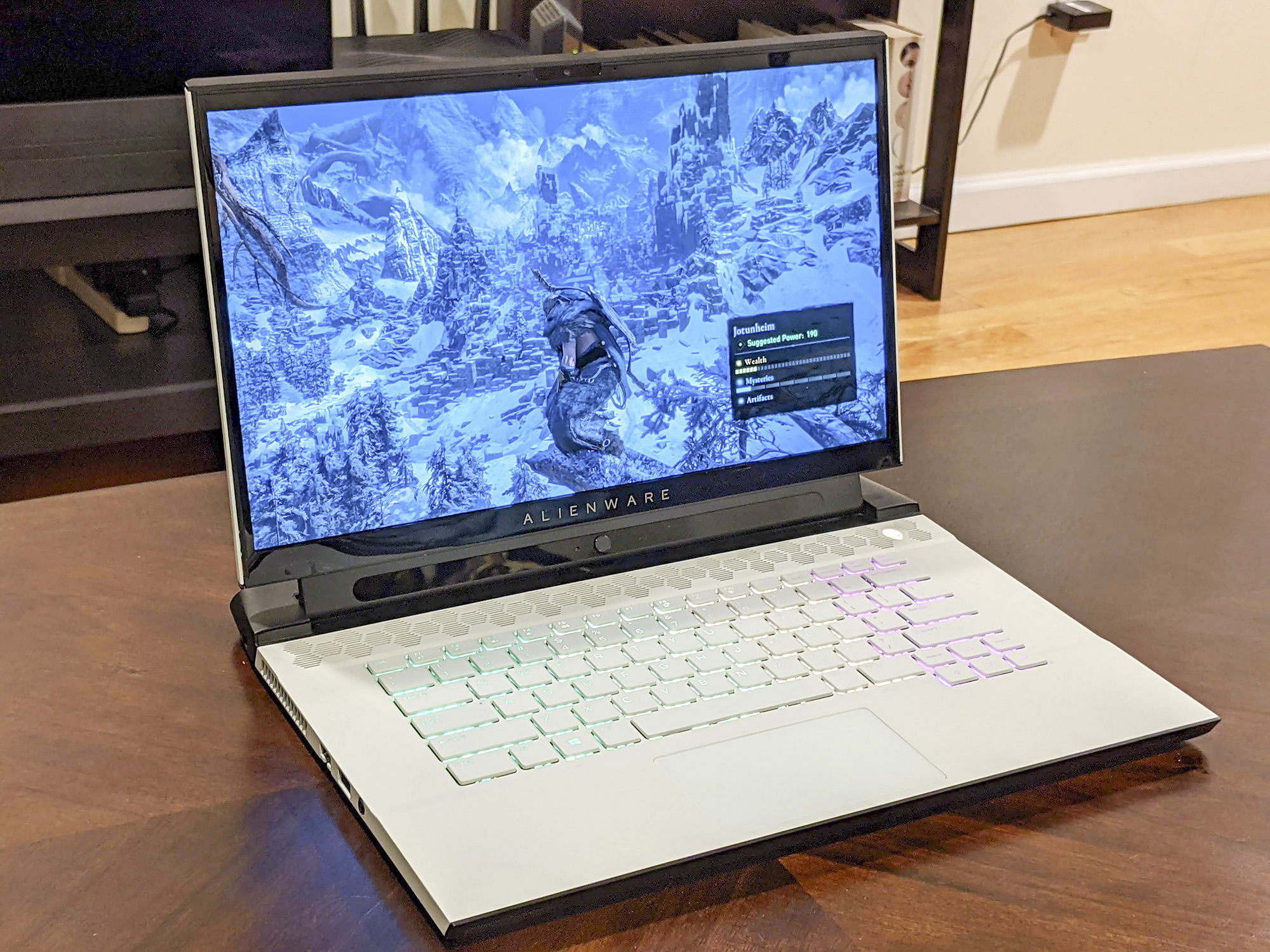
I also appreciated the laptop’s size and weight: 15.3 x 12.0 x 1.0 inches, and 5.3 pounds. As 15-inch gaming laptops go, that’s a pretty modest profile, and the laptop should fit easily in most bags and backpacks. The power brick is pretty large and heavy in its own right, of course, but that’s hardly unique to the m15 R4.
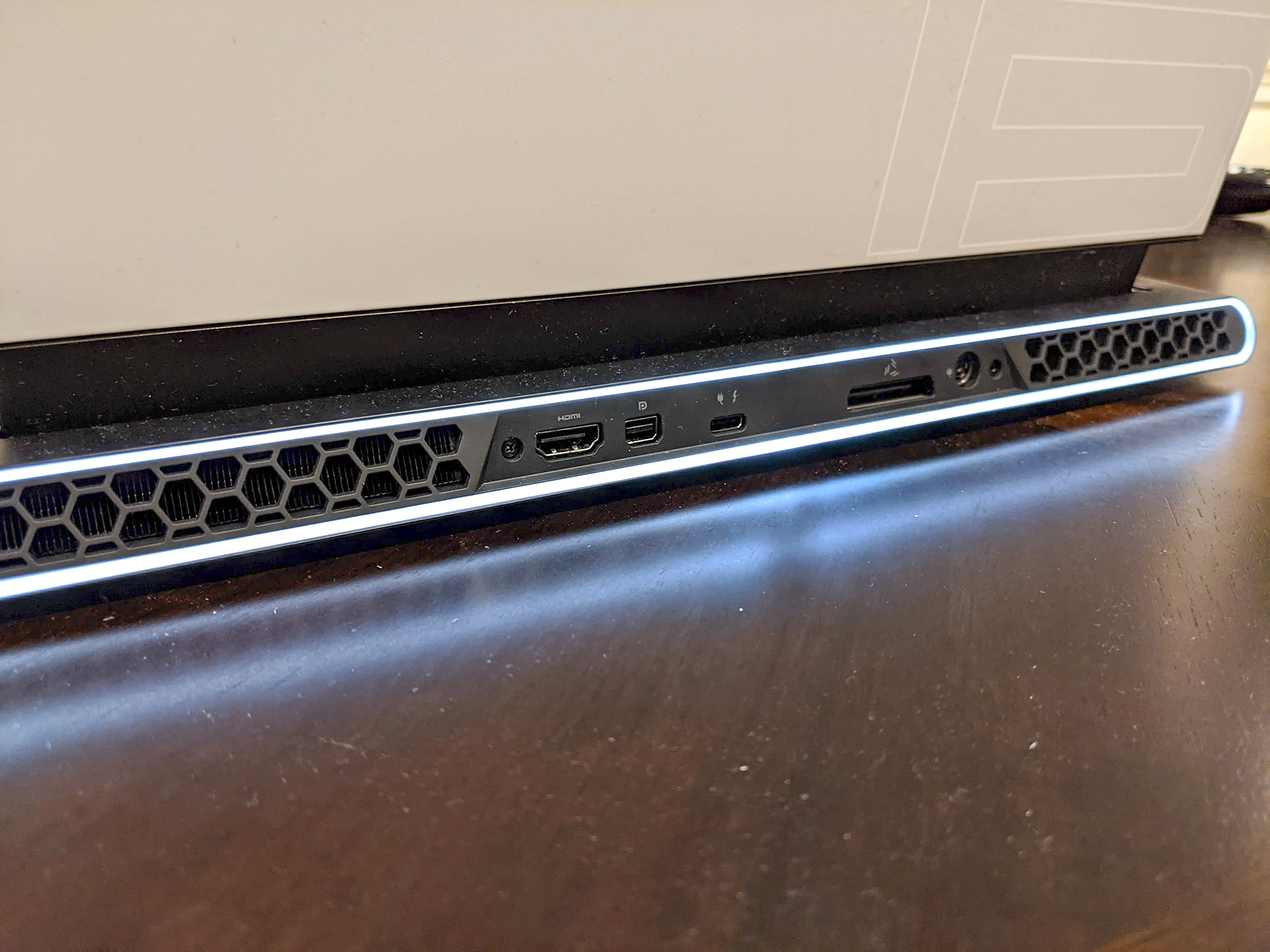
Aesthetics aside, the ports merit some praise and some criticism. The selection itself is above reproach. On the right, you’ll find two USB-A ports and a microSD slot. On the left, there’s an Ethernet port, a USB-A port and a 3.5 mm audio jack. These are all well and good.
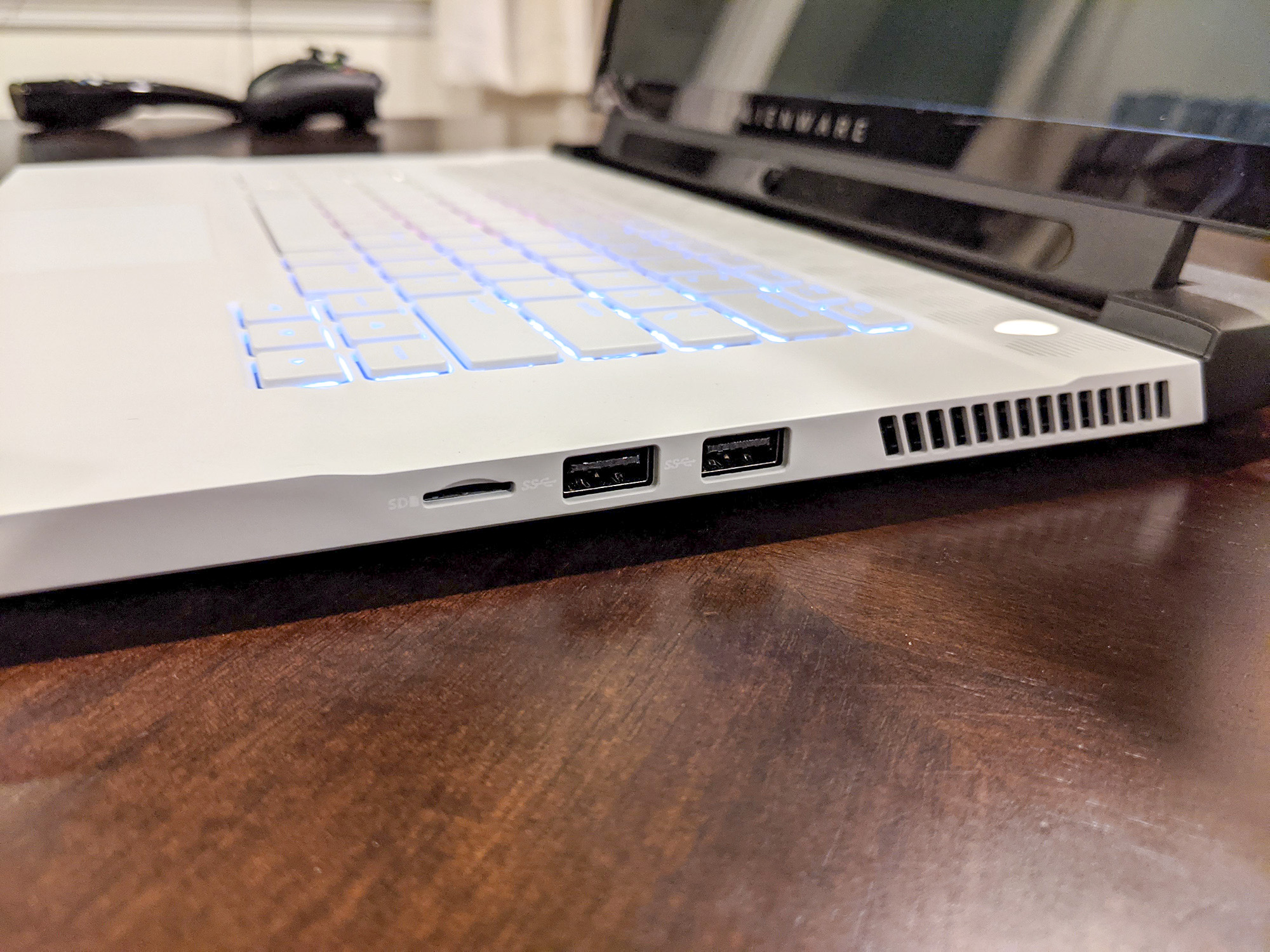
The back is where things get a little less optimized. In addition to a rather inconvenient power port (slightly left-of-center on the back – just far enough from anything to comfortably reach), there’s an Alienware Graphics Amplifier connection, a USB-C port with Thunderbolt 3 support, a mini-DisplayPort and a full-size HDMI port.
On the one hand, the USB-C port is an integral part of Alienware’s eGPU setup, so there needs to be one on the back of the m15 R4. On the other hand, USB-C is already a common way to charge phones and connect peripherals. Giving users only a single port, then hiding it away on the back of the machine, makes the laptop feel much less future-proof than it should.
Alienware m15 R4 review: Keyboard and touchpad
While some gaming laptops incorporate full mechanical keyboards (with mixed results), the Alienware m15 R4 keeps things simple with an elegant membrane setup. Each key feels pretty decent, with short travel, fast actuation and a rapid spring-back. While I was very happy to go back to a full-size mechanical model after I was done testing the m15 R4, the keyboard felt perfectly comfortable while I was working with it.
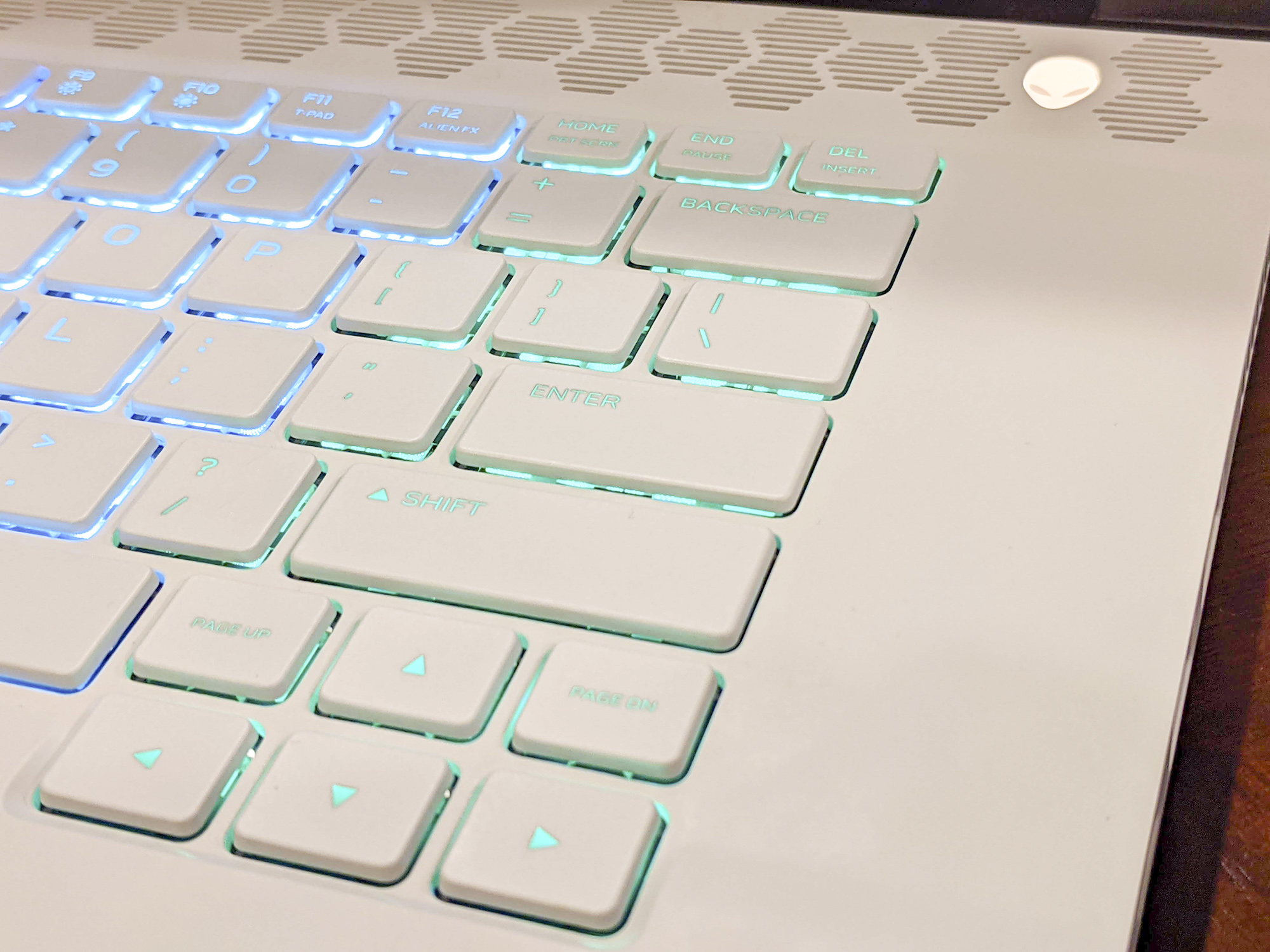
Admittedly, the keys can be a little cramped, and substitution errors were more common than I would have liked. Furthermore, there’s a ton of bezel space around the keyboard, which makes me wonder whether the keys could have been spaced out a little better – or even if it might have been possible to include a few programmable keys. On the other hand, I was reasonably pleased with the four-zone RGB options, which sent a gentle rainbow wave across the keys as I typed. (You can change colors or deactivate the RGB entirely in the Alienware software.)
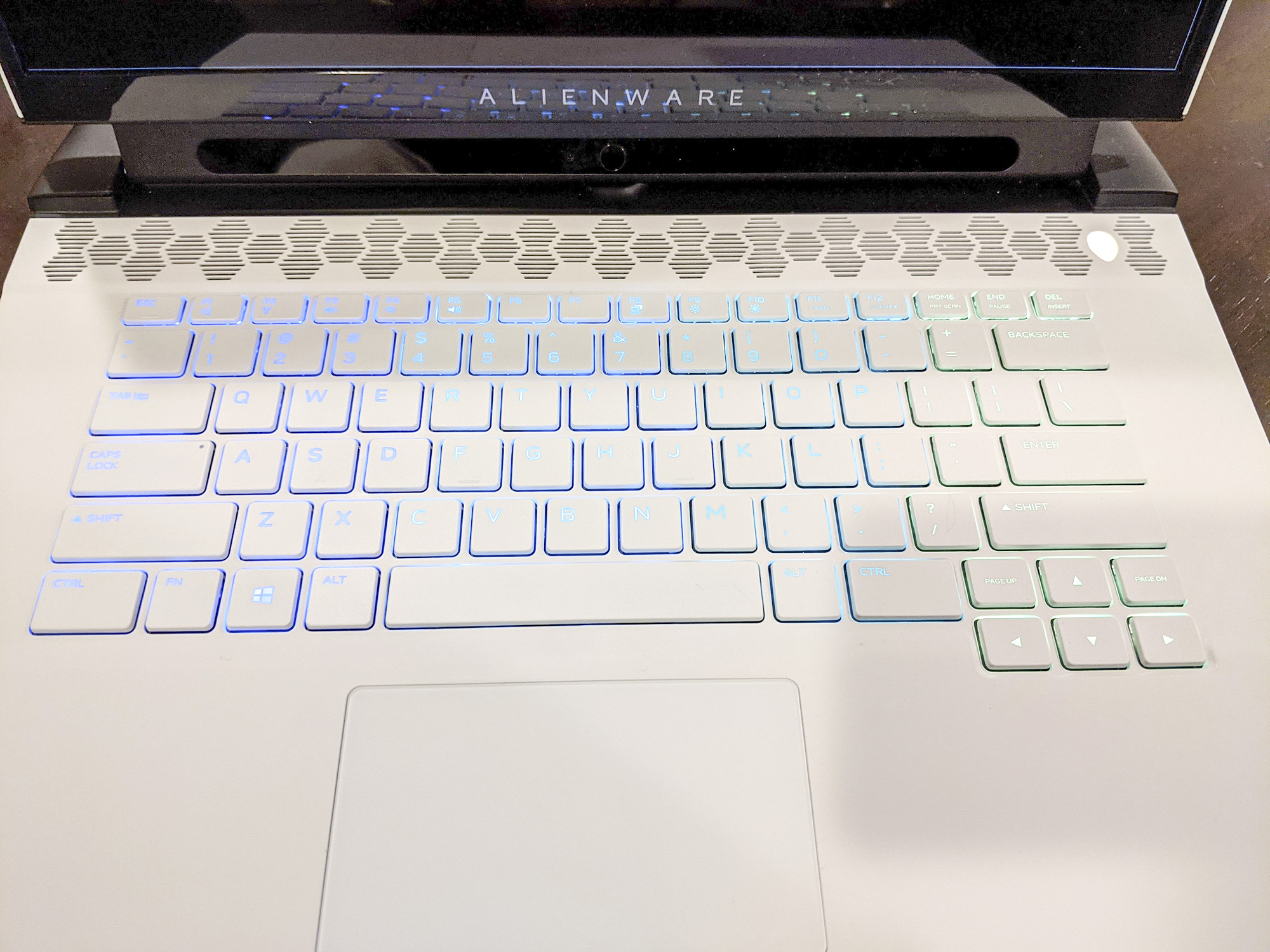
The m15 R4’s touchpad, on the other hand, earns the highest praise I have ever bestowed upon a gaming laptop’s touchpad: “pretty decent.” Unlike the vast majority of laptop touchpads, this one never got in the way, even when I rested my hands on either side of it while typing. It’s positioned in such a way to avoid errant palm inputs, and tracks purposeful movements accurately. I still recommend a mouse – especially for gaming – but I wish more gaming laptop touchpads were like the m15 R4’s.
Alienware m15 R4 review: Display and audio
The Alienware m15 R4 that we reviewed came with a 4K, 60 Hz screen; you could also get it with a 1080p, 300 Hz screen, if you prefer higher frame rates. While I can’t comment on the 1080p screen, I can say that the 4K screen is extremely bright, and offers a rich color palette – not surprising, perhaps, since it’s an OLED display.
The screen offers an average of 460 nits of brightness, which can feel downright overwhelming, especially at night. Compare and contrast to the Asus ROG Zephyrus G14 at 323 nits, or the Acer Predator Helios 300 at only 276 nits. After I set up the m15 R4, the very first thing I did was turn down the brightness, and now I understand why.
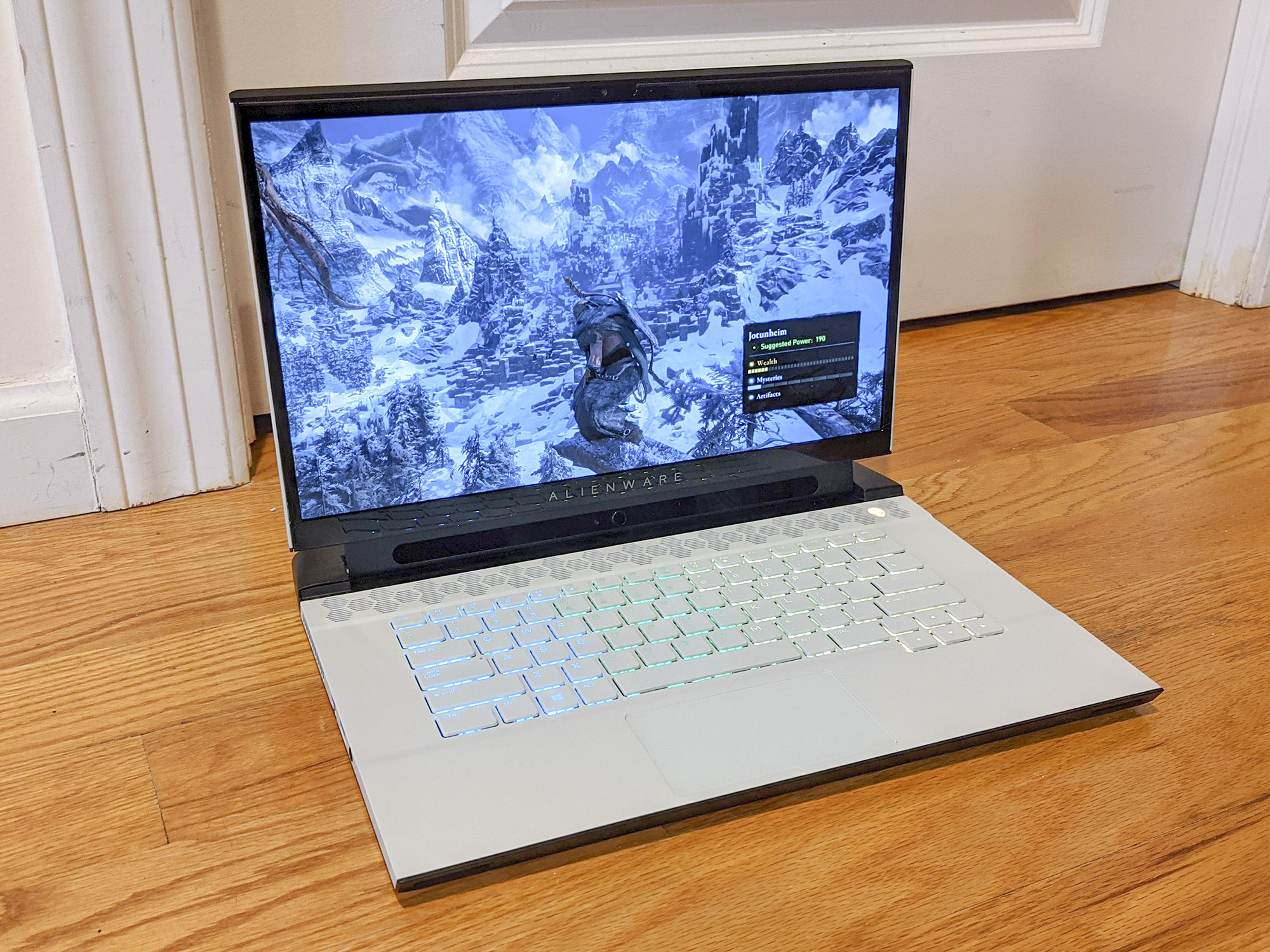
In terms of color, the m15 R4 can display a whopping 211% of the sRGB spectrum, with a delta-E color accuracy of 0.32. (Closer to zero is better; this is a very good score.) The G14 scored 117% on sRGB gamut and the Helios 300, only 106%. Whatever you display on the m15 R4’s screen, it’s probably going to look gorgeous.
From a qualitative perspective, I have only a handful of issues, and none of them is a dealbreaker. First, the screen is highly reflective, especially if you sit with your back to a window, as I often do. There’s really no way around this issue, except to wear dark clothing, or to change where you sit. Second, the webcam is a 720p model that produces fuzzy, washed-out pictures. This feels underpowered for a laptop that uses such powerful hardware otherwise.
Finally, if you want the 4K screen, you have to get a secondary Tobii eye-tracking webcam as well, which I couldn’t find a use for. Getting into the pros and cons of eye-tracking for gaming and streaming is beyond the scope of this review, but I don’t think it’s too controversial to say that the number of people who want eye-tracking is probably a lot smaller than the number of people who want a 4K screen.
The m15 R4’s built-in speakers get the job done, although I didn’t have much occasion to use them. That’s because even during productivity tasks, the fan blasts loud streams of air almost constantly at default settings. In order to hear music, movie, TV show and game audio, I had to turn the volume way up, and the speakers can distort sound fairly easily. “Just get a gaming headset” is a cliché when it comes to gaming laptops, but you really should just get a gaming headset.
Alienware m15 R4 review: Performance
The Alienware m15 R4 delivers where it counts most: gaming performance. This machine is a powerhouse at 1080p, and even holds its own at 4K with graphical settings cranked all the way up. (To save you some suspense: It can’t do 4K/60 fps, unless you turn down a lot of the secondary graphical settings. But I can’t think of many laptops that can.)
Tom’s Guide put the m15 R4 through its paces with Assassin’s Creed Valhalla (70 fps at 1080p; 35 fps at 4K), Grand Theft Auto V (108 fps at 1080p; 35 fps at 4K), Red Dead Redemption 2 (68 fps at 1080p; 27 fps at 4K) and Shadow of the Tomb Raider (77 fps at 1080p; 33 fps at 4K). Of those games, only Red Dead Redemption 2 fell below our threshold for a comfortably playable 4K experience – and you could always compromise with a QHD resolution.
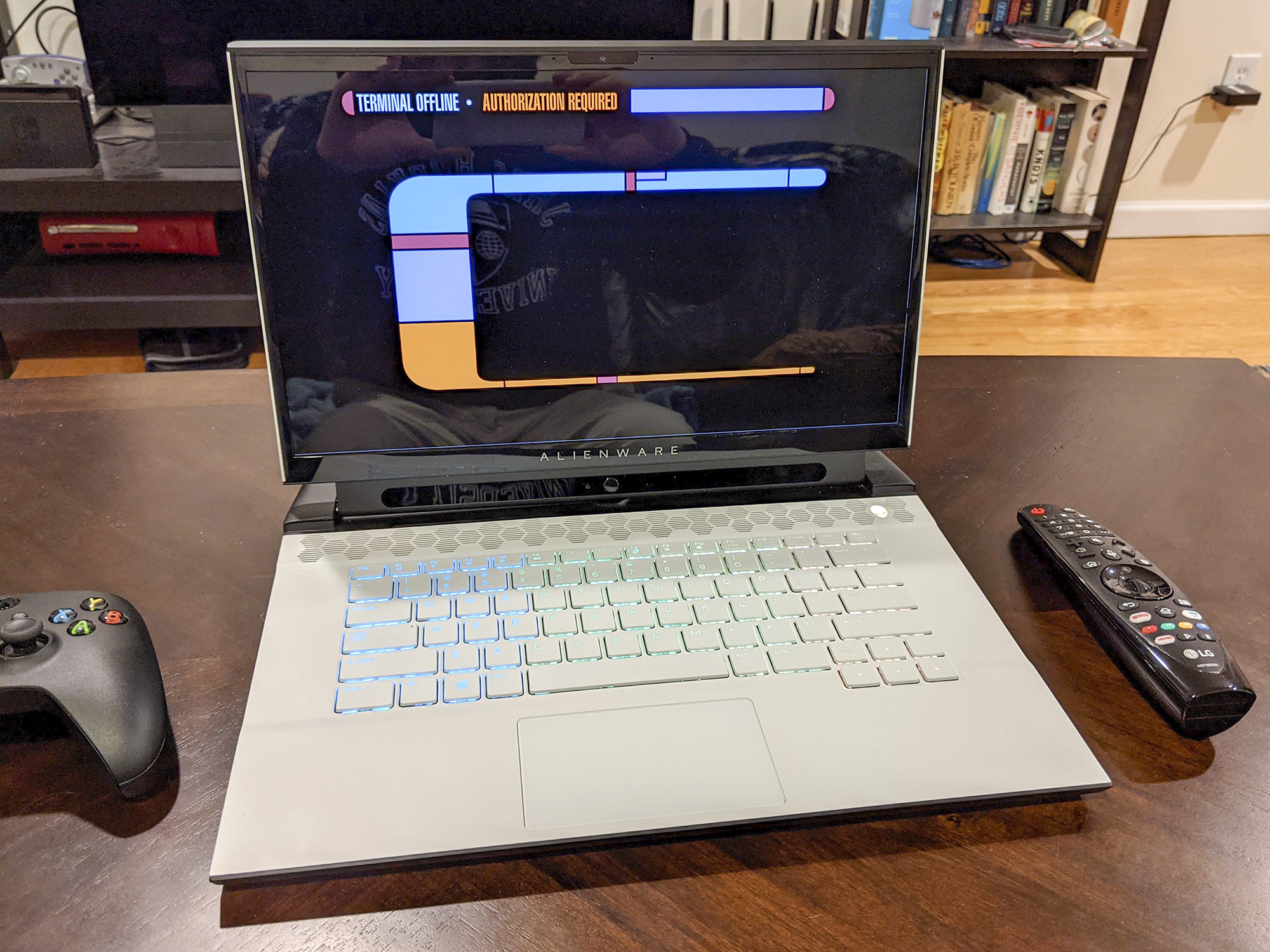
Compare and contrast this to the Zephyrus G14, equipped with an Nvidia GeForce RTX 2060: GTAV scored 115 fps at 1080p and Shadow of the Tomb Raider scored 49 fps at 1080p. The similarly 2060-equipped Helios 300 scored 55 fps at 1080p for Assassin’s Creed Odyssey (the Odyssey/Valhalla benchmarks are comparable), and 81 fps at 1080p for GTAV. Neither the G14 nor the Helios 300 had 4K displays, so the m15 R4’s versatility already gives it a leg up over the competition.
Qualitatively speaking, I got similar results with Age of Empires III: Definitive Edition, Doom Eternal, Control and Final Fantasy XIV. Since the 4K screen maxes out at a 60 Hz anyway, I generally turned up the resolution and didn’t sweat the frame rate. All of the games ran smoothly, even at Ultra settings – with the exception of Control, with ray-tracing turned on. This caused the frame rate to drop into the 20s, and forced me to choose between QHD resolution and gorgeous lighting effects. If games with ray tracing running at full 4K is a requirement, you’ll probably want to go with one of the m15 R4’s more expensive configurations.
Given the m15 R4’s powerful hardware, I wasn’t surprised that it ran games beautifully, whether I was exploring populous cities in Eorzea, or building up Dutch armies in the New World. What did impress me, though, was just how rich the colors looked, particularly in Doom Eternal’s rocky red landscapes. The OLED screen supports a gorgeous, vibrant palette (remember: 211% of the sRGB spectrum), and no other medium shows this off as beautifully as gaming does.
In terms of artificial benchmarks, the m15 R4 earned a Geekbench 5.3 score of 7,636 — quite high, in a vacuum, although we haven’t run the test on any other gaming laptops just yet. Instead, compare and contrast the m15 R4’s score on Geekbench 4.3: 30,043. This is just shy of the G14 Zephyrus’ 30,181 points, although it’s admittedly odd that a newer, more powerful machine would earn a lower score.
It’s also worth mentioning the Alienware suite of software, which lets you set up fan, lighting and performance profiles for various games and apps. The software can also keep your system up to date, and connect you with customer support representatives. As built-in software goes, it’s inoffensive, and it actually works better here than it does on Alienware’s R11 desktop. Once I installed all the requisite hardware updates, however, I didn’t see much need to use it again.
Alienware m15 R4 review: Heat
One of my biggest complaints about the Alienware m15 R4 has to do with how the laptop manages heat. In terms of raw temperatures, it’s not so bad: I rarely saw the GPU exceed 60 degrees Celsius. While running productivity software, the touchpad hovers around 81 degrees Fahrenheit, and the keyboard seldom exceeds 96 degrees Fahrenheit, which is just a hair north of our 95-degree comfort threshold.
While gaming, however, the keyboard can reach temperatures exceeding 108 degrees Fahrenheit, which can be troublesome if you rest your fingers on the keyboard in-between actions. (The touchpad does not get very hot, but I also don’t know many people who game with a touchpad.)
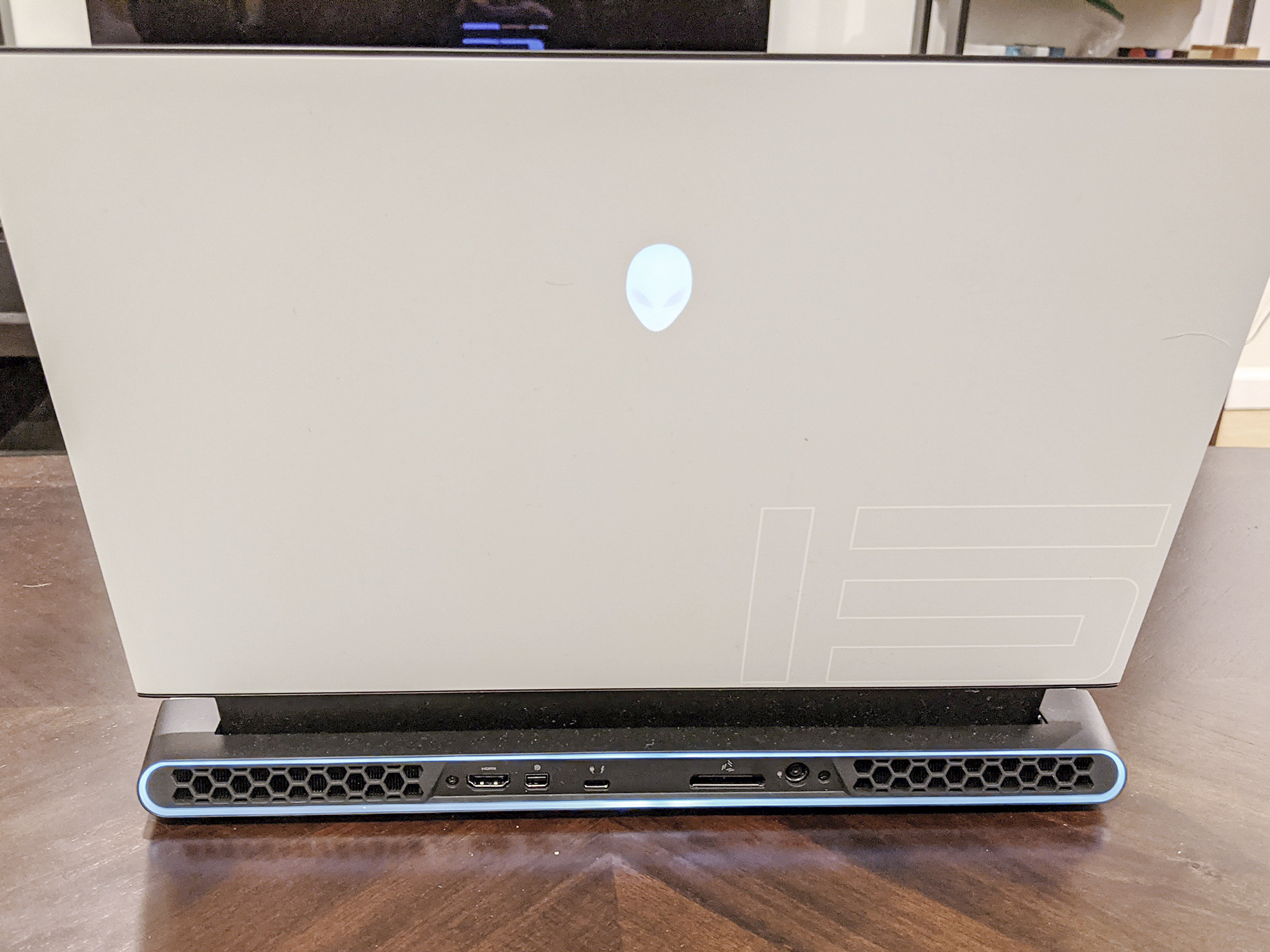
The bigger issue is that the fan, which does an admirable job of cooling the system off, makes a huge, constant racket. My domestic partner was sitting next to me at our dining room table while I tested the machine, and asked why her papers kept getting blown around. The fan was too loud to hear music or Netflix audio tracks, to say nothing of games. It wasn’t until I discovered the “Quiet” fan profile in the Alienware software that I was able to restore a modicum of peace in my apartment.
I realize that a loud fan is very much the lesser of two evils when it comes to gaming laptops. After all, a GPU overheating is a much worse outcome than a lot of unwanted noise. But even by gaming laptop standards, the m15 R4 is an incredibly loud device, and its default settings are not good at finding a balance between noise and temperature.
Alienware m15 R4 review: Battery life
If the Alienware m15 R4 has one significant weakness, it’s in the product’s battery life. While our general laptop battery test – surfing the Web constantly in Microsoft Edge – rated the m15 R4 at four hours and one minute, I was never able to get anything close to this, even just working with Microsoft Word and Google Chrome. With medium brightness and a stable Internet connection, the laptop had, at best, about two hours of life in it.
While gaming, the situation is even bleaker at one hour and 14 minutes, according to our lab tests. In practice, I got about 45 minutes. It’s better than nothing, but the m15 R4 is not a very good companion for taking long trips – unless you’re seated next to a power outlet.
Alienware m15 R4 review: Verdict
The Alienware m15 R4 is easily one of the best gaming laptops I’ve ever reviewed. And, to be fair, for $2,150 (at least!), it really should be. You do indeed get what you pay for, between a powerful GPU, a fast SSD, a gorgeous design and a vibrant screen.
While I wish the fan were a little quieter, and the battery lasted a little longer, these are ultimately acceptable sacrifices in a machine that’s designed primarily with home gaming in mind. If you decide to invest in an Alienware Graphics Amplifier and use the m15 R4 as an ersatz desktop, so much the better.
In terms of competitors, the Zephyrus G14 is still worth considering, although since that computer has a last-gen GPU, it’s a tougher sell now than it was a year ago. Stay tuned while we review some more laptops with 30-series GPUs – or pick up the m15 R4, which should serve you well for the next few years.
For all the latest Technology News Click Here
For the latest news and updates, follow us on Google News.
